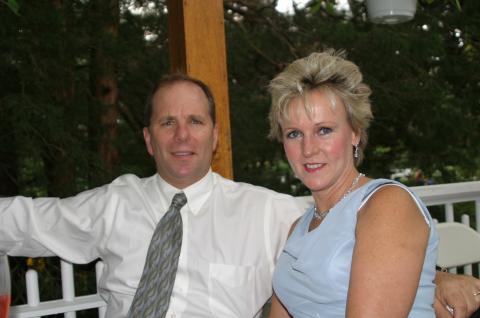Personal
-
The Personal Folio represents a snapshot of
my personal life and interests.
I grew up as the middle child of three children in The
"Cathcart family". They say the middle child is the
one with the psychological problems - so I married a
psychologist. My husband, Bruce, is the main reason for
the opportunity to pursue a doctoral degree. His support and
love have made it all possible.
After our third date, Bruce said that he wanted to play his guitar
for me. I was afraid he was going to strum "Raindrops
keep fallin' on my head" (by BJ Thomas) and that would be the
end of this blossoming relationship. It turns out he plays a
mean guitar and I was pleasantly surprised (and relieved) by how
beautifully he played. So I married him.
I have to say that remembering back, I had a great
childhood - loving parents, annoying siblings and dinner on the table at 5:30
every night after my father came home from his job as an
engineer with SperryRand. We had a dog named Boots, a few
cats, and a hamster that got lost in the house.
We always went to church on Sundays and bought bagels for
lunch on the way home.
In the summer we went to the beach every weekend. I
learned how to swim and ride the waves in the ocean.
Before I was old enough to go to school I thought there was
a "school year" and a "summer year" - both seemed to last as
long as the other.
My father was born in
Glasgow, Scotland. We had a lot of fun partaking in the
Scottish traditions. We sang songs together with Scottish
accents, danced to the bagpipes and ate fish and chips.
My younger sister Christine didn't want to be Presbyterian
as a child but wanted to be a Jew because it was easier to
spell. My older brother Andrew takes after my father's
engineering ability and is able to fix anything that is
broken and can build anything that hasn't been built. My
mother sings in the choir, currently works as a resource
room teacher in a private school and remains the prettiest
mom there is.
Lucky me.

Click here for pictures of friends and
family
Personal and Community Interests

My horse "Allie"
is used as a Therapeutic Riding Horse at Horseability
(see below).
Horseability
HorseAbility
offers a wide range of opportunities for our clients including a
Therapeutic Riding Program a Hippotherapy Program, a one-week Summer
Day Camp, and an Equine Facilitated Therapy Program.
HorseAbility also offers many volunteer opportunities.
Horse experience is not a necessity. There are many areas in which
volunteers are needed! HorseAbility, located in
Melville NY, and currently provides quality equine experiences year
round to over three hundred clients with the assistance of more then
three hundred and fifty volunteers and continues to grow.
The benefits of
therapeutic riding are available to individuals with psychological,
physical, social, and emotional disabilities, which include but are
not limited to:
| Muscular Dystrophy |
Cerebral Palsey |
| Visual Impairments |
Down's Syndrome |
| Mental Retardation |
Developmental Delay |
| Learning Disabilities |
Autism |
| Hearing Impairments |
Paralysis |
| Emotional Disabilities |
Brain Injuries |
| Multiple Sclerosis |
Pervasive Developmental
Disorder |
| Amputations |
Developmental Disabilities |
| Anxiety |
Attention Deficit Disorder |
| Depression |
Sensory Integration Disorder |
Sponsoring children in need is breaking the cycle of
poverty
Sponsoring children
to insure one hot meal a day, the ability for both boys and girls to attend school
everyday and to worship on Sunday with other children in Sunday school.
Compassion International exists as a Christian
child advocacy ministry that releases children from spiritual,
economic, social and physical poverty and enables them to become
responsible, fulfilled Christian adults. Founded by the Rev. Everett
Swanson in 1952, Compassion began providing Korean War orphans with
food, shelter, education and health care, as well as Christian
training. Today, Compassion helps more than 1 million children
in 24 countries.
Shinnecock Substance Abuse Mobilization Project (SAMP)
Substance abuse
is a debilitating disease (dis-ease) which negatively affects the
individual and his or her family physically, medically, emotionally
and spiritually. Studies have shown the Native Americans for a
variety of reasons such as genetic predisposition, geographic
isolation or cultural deprivation are susceptible to the ravages of
this disease.

|